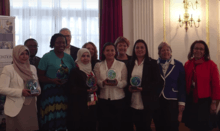Elsevier Foundation Award
The OWSD - Elsevier Foundation Awards for Early-Career Women Scientists in the Developing World[1] is awarded annually to early-career women scientists in selected developing countries in four regions: Latin America and the Caribbean, East and Southeast Asia and the Pacific, Central and South Asia, and Sub-Saharan Africa.[2]

The Organization for Women in Science for the Developing World (OWSD), the Elsevier Foundation, and The World Academy of Sciences have partnered to recognize achievements of early-career women scientists in developing countries since the award was launched in 2011 as the Elsevier Foundation-OWSD Awards for Young Women Scientists from the Developing World.[3][2] The award program is open to female scientists who live and work in one of 81 developing countries.[2] Nominations are generally submitted within ten years of the nominee earning a PhD.[4][5]
The maximum number of recipients is currently restricted to five per year: one from each of the four OWSD-recognized regions, plus one additional outstanding candidate, and the awards are granted with a rotating theme annually among three general fields: biological sciences (agriculture, biology and medicine), engineering/innovation & technology, and physical sciences (including chemistry, mathematics and physics).[6][2]
As of 2014, the award includes an honorarium of US$5,000, one year of access to Elsevier's ScienceDirect publication database, and an expense-paid trip to the annual meeting of the American Association for the Advancement of Science, where an awarding ceremony is held.[4]
Recipients
Recipients have included:[4]
2011
The 2011 awards recognized eleven contributors to biology, physics, and chemistry.[7]
- Mahfuza Begum, biologist, Bangladesh
- Rukmani Mohanta, physicist, India
- Farzana Shaheen, chemist, Pakistan
- Janet Ayobami Adermola, physicist, Nigeria
- Aderoju Amoke Osowole, chemist, Nigeria
- Denise Evans, biologist, South Africa
- Nahla Ismail, chemist, Egypt
- Lubna Tahtamoouni, biologist, Jordan
- María Magdalena González Sánchez, astrophysicist, Mexico
- Lisset Hermida Cruz, biologist, Cuba
- Silvina Pellegrinet, chemist, Argentina
2013
THe 2013 awards were focused on medical science and public health.[5]
- Adediwura Fred-Jaiyesimi, pharmacologist, Nigeria
- Nasima Akhter, medical scientist, Bangladesh
- Dionicia Gamboa, molecular biologist, Peru
- Namjil Erdenechimeg, biochemist, Mongolia
- Huda Omer Basaleem, community health researcher, Yemen
2014
The 2014 awards were focused on chemistry.[8]
- Nilufar Mamadalieva, bioorganic chemist, Uzbekistan
- Leni Ritmaleni, pharmaceutical chemist, Indonesia
- Simone Ann Marie Badal McCreath, biochemistry researcher, Jamaica
- Eqbal Mohammed Abdu Dauqan, biotechnologist, Yemen
- Taiwo Olayemi Elufioye, pharmacologist, Nigeria
2015
In 2015, the awards were focused on physics and mathematics.[8]
- Nashwa Eassa, nano-particle physicist, Sudan
- Dang Thi Oanh, computational mathematician, Thailand
- Mojisola Oluwyemisi Adeniyi, atmospheric physicist, Nigeria
- Mojisola Usikalu, radiation physicist, Nigeria
- Rabia Salihu Sa'id, environomental physicist, Nigeria
2016
The 2016 awards focused on medical science and public health.[9]
- Sri Fatmawati, pharmacologist, Indonesia
- Sushila Maharjan, biochemistry researcher, Nepal
- Magaly Blas, public health specialist, Peru
- Etheldrera Nakimuli‐Mpungu, psychiatric epidemiologist, Uganda
- Ghanya Naji Mohammed Al-Naqeb, nutritional researcher, Yemen
2017
The 2017 awards were focused on engineering and technology.[10]
- Tanzima Hashem, computer scientist, Bangladesh
- María Fernanda Rivera Velásquez, environmentalist, Ecuador
- Felycia Edi Soetaredjo, environmental energy specialist, Indonesia
- Grace Ofori-Sarpong, environmental resource management, Ghana
- Rania Mokhtar, scientific project coordinator, Sudan
2018
The 2018 awards focused on mathematics, chemistry, and physics.
- Hasibun Naher, applied mathematician, Bangladesh
- Germaine Djuidje Kenmoe, physicist, Cameroon
- Silvia González Pérez, computational chemist, Ecuador
- Dawn Iona Fox, environmental chemist, Guyana
- Witri Wahyu Lestari, organometallic chemist, Indonesia
2019
The 2019 awards focused on medical science and public health.[2]
- Narel Paniagua-Zambrana, ethnobotonist, Bolivia
- Uduak Okomo, health services, Nigeria
- Tabassum Mumtaz, environmental biotechnologist, Bangladesh
- Amira Shaheen, public health researcher, Palestine
- Tista Prasai Joshi, chemist, Nepal
References
- "Awards | OWSD". owsd.net. Retrieved 27 December 2019.
- "OWSD-Elsevier Foundation Awards for Early-Career Women Scientists in the Developing World". Elsevier. Retrieved 6 December 2019.
- "Elsevier Foundation Awards 2012 Grants to Champion Libraries in Developing Countries and Women in Science". Elsevier. 11 December 2012. Retrieved 12 April 2018.
- "Elsevier Foundation award". Elsevier. Retrieved 6 December 2019.
- "The Elsevier Foundation, OWSD and TWAS call for nominations for 2014 Awards". The World Academy of Sciences. 10 April 2013. Retrieved 11 April 2018.
- "The OWSD–Elsevier Foundation Awards for Early-Career Women Scientists in the Developing World". Organization for Women in Science for the Developing World. Retrieved 6 December 2019.
- "Eleven Women Scientists Announced as Winners of Elsevier Foundation OWSD Awards". Elsevier. 29 September 2011. Retrieved 5 June 2019.
- Schemm, Ylann; Bert, Alison (18 February 2014). "Women chemists from developing countries honored for research of natural medicinal compounds". Elsevier. Retrieved 12 April 2018.
- Bert, Alison (10 March 2016). "Translating life into science – 5 women tell their stories". Elsevier. Retrieved 12 April 2018.
- Schmitz, Laura (16 February 2017). "Women engineers to receive awards for innovative research in developing countries". Elsevier. Retrieved 12 April 2018.